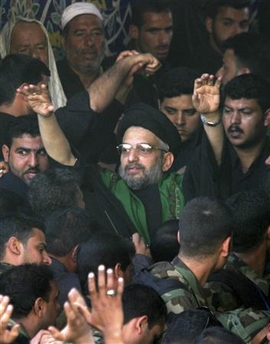US, Syria, Iran officials to meet in Baghdad
(Reuters)Updated: 2007-03-10 09:18
BAGHDAD - US officials will sit down with their Iranian and Syrian counterparts on Saturday at a conference in Baghdad aimed at stopping sectarian fighting in Iraq before the conflict spreads throughout the oil-rich region.
 Iraqi Shi'ite political leader Abdul-Aziz al-Hakim (C) waves to supporters during the Arbain religious event in the holy city of Kerbala, 110 km (70 miles) south of Baghdad, March 9, 2007. (Reuters)  |
The one-day conference brings together mid-level officials from Iraq's neighbors, the permanent UN Security Council members -- the United States, Russia, China, Britain and France -- and Arab countries. There will be 16 delegations in all.
But attention is likely to be focused on the United States sitting down with Syria and Iran, both accused by Washington of fuelling the Iraq war by supporting either Sunni insurgents or Shi'ite militias. Iran and Syria deny the charges.
"We do not want Iraq to be the battleground to settle scores for other countries and for them to settle their scores with the United States here at our expense," Iraqi Foreign Minister Hoshiyar Zebari told Reuters in an interview on Friday.
President George W. Bush said the US message to Damascus and Tehran would be clear at Saturday's conference.
"Our message to the Syrians and Iranians won't change at that meeting ... we expect you (Syria and Iran) to help this young democracy," he said.
The United States would "defend ourselves and the people in Iraq from weapons shipped in to cause harm," he added.
US-IRANIAN TENSION
While the conference seeks ways to provide regional support for the Iraqi government, it comes against a background of increasing US-Iranian tension over Tehran's nuclear ambitions.
Washington has led international efforts to impose tougher sanctions on Iran over its refusal to stop enriching uranium, which could be used for nuclear weapons, and has accused Iran of backing Shi'ite militias in southern Iraq. Tehran denies both.
"For us to succeed in our security plan and political plan, we need a viable, conducive regional environment," Zebari said.
"We need to ensure that our neighbors would play a constructive role, or at least not to hinder our efforts."
Washington, which has no diplomatic relations with Iran, has had contacts with Iranian officials in group settings, including as recently as September, but has resisted bilateral talks.
The United States has diplomatic relations with Syria but withdrew its ambassador to Damascus in early 2005 and has not had high-level contacts for the past two years.
Zebari said Iraq could also help bring foes together.
"Despite Iraq's current difficulties, it is capable of helping its neighbors by providing this forum," he said. "It would have been extremely difficult to get this number of people in one room to sit together."
Zebari said Iran had always taken a positive approach to Iraqi governments since the invasion.
"This (meeting) gives them an opportunity. They are under siege now as we speak. They need an opening to show they are willing to talk, to discuss, to live up to their commitments and we are giving them that opportunity," Zebari said.
Prime Minister Nuri al-Maliki is due to address the opening session of the meeting, which will be open to the media, before the delegations get down to business behind closed doors.
"This will be the largest gathering of countries in Baghdad since 1990," Zebari said. Most countries will be represented at deputy foreign minister level and he said they would prepare the ground for more senior meetings in the coming months.
|
||
|
||
|
|